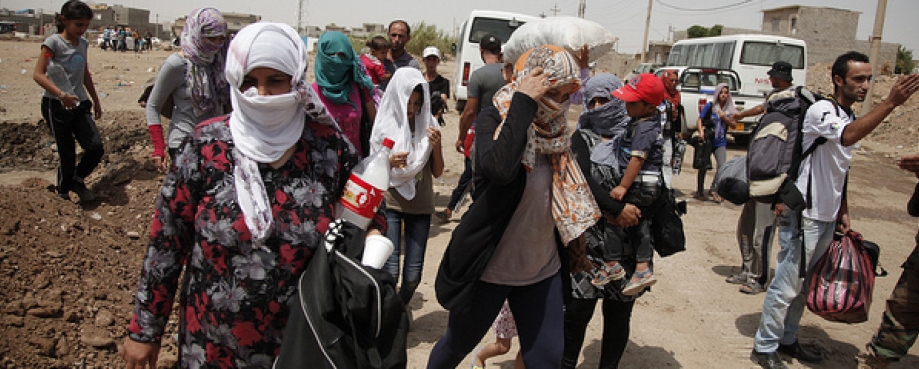
Following the UK government-led Supporting Syria and the Region Conference 2016 held at the beginning of February - and in advance of an ETI members event to discuss regional sourcing strategies - ETI's Executive Director, Peter McAllister reflects on the role of business in supporting Syrian refugees whose lives have been devastated by civil war.
At the beginning of February, in my position as Executive Director of ETI, I was invited to attend the ‘Supporting Syria and the region’ conference hosted by UK Prime Minister, David Cameron and attended by world leaders, senior EU officials, the UN Secretary General and other heads of international agencies.
While the main aim of the conference was to pledge the funds needed to support Syrian refugees living in countries in the region, it was recognized that a long-term response must be based on a political solution to the crisis. Within that, job creation was discussed as a strategy to help the region at large and through this, refugees in particular.
Jordan, Turkey and Lebanon are hosting unprecedented numbers of refugees
Countries like Jordan, Turkey and Lebanon are hosting unprecedented numbers of refugees – in the case of Jordan at a scale of 20 per cent of their national population. Host countries report the situation as being at breaking point, with potential impacts on further refugee flows to Europe and beyond if the immediate local needs of refugees are not met.
As in other refugee situations, political responses often take years to put in place and for refugees to return home. Much of the discussion was therefore rightly about the immediate provision of food, healthcare, education and protection – both in and outside refugee camps.
Yet, humanitarian efforts need to be combined with investment that can bring about more long-term and sustainable solutions for refugees and their host communities. That means creating investment and jobs, addressing unemployment issues in the region as well as providing income opportunities and much needed dignity for refugees.
But what does this mean for business?
Many Middle Eastern countries are already part of global supply chains that reach into markets in Europe, North America and beyond. Notable are garment supply chains in Turkey and Jordan, but there are also agricultural exports, flowers for example and some manufactures.
We know that Syrian refugees are finding their way into employment, often illegally, in the formal sector, or in the less visible informal sector. One interesting observation made by a Syrian businessman now based in the UK is that the number of Syrian businesses in Turkey has gone from 30 to 2,000 in only a few years, with many of these operating unlawfully.
So there is already a need for those businesses sourcing from the region to go beyond typical audit and compliance approaches to better understand how their business operations may overlap with the vulnerability of refugees, including beyond the obvious first tier supplier.
The conference pledged hundreds of millions of dollars to invest in trade
Individual nations, multilateral organizations and development banks pledged considerable funds – in the order of hundreds of millions of dollars – to invest in the infrastructure that supports increased investment and trade. As well as discussing tariffs and taxes, this included improving trading conditions, such as adjusting the rules of origin that would qualify for privileged access to the EU.
Additionally, there are plans to provide local SMEs with access to preferential financing to help develop local business and job opportunities. With both the political and financial support that is likely to be provided, the region may well become a more prominent part of global supply chains in the near future.
However, ETI's experience is that without active collaboration by business and between businesses, trade unions and NGOs, the risk is that the jobs created will not meet international standards such as those described in the ETI Base Code.
While there remains work to be done in other sourcing markets, we now have an opportunity to incorporate the regulation, relations and initiatives that can ensure decent work is built into the investment and new jobs that are probably going to be created in the region.
Furthermore, failure to create decent jobs will mean not achieving the promise that business has to offer in this context and will also place any brand investing in the region at significant reputational risk, given the very high profile nature of this ongoing crisis.
ETI will host an event in March for members to help create a better understanding of the situation, what likely investments and plans might mean and what business should be thinking about if sourcing from the region or thinking of doing so.
